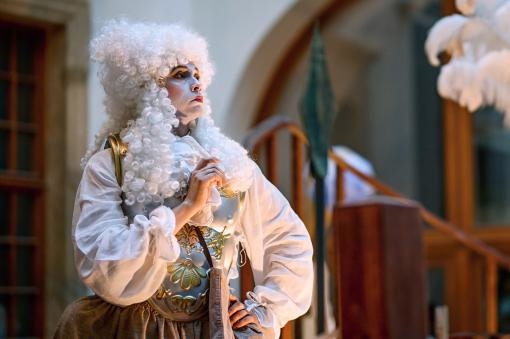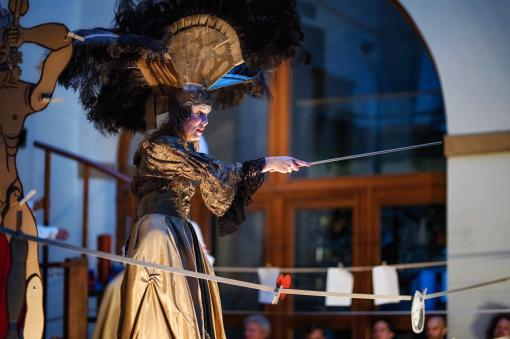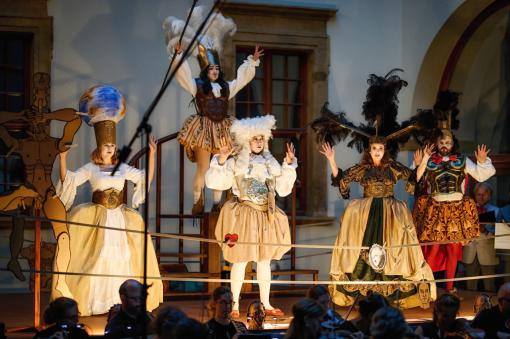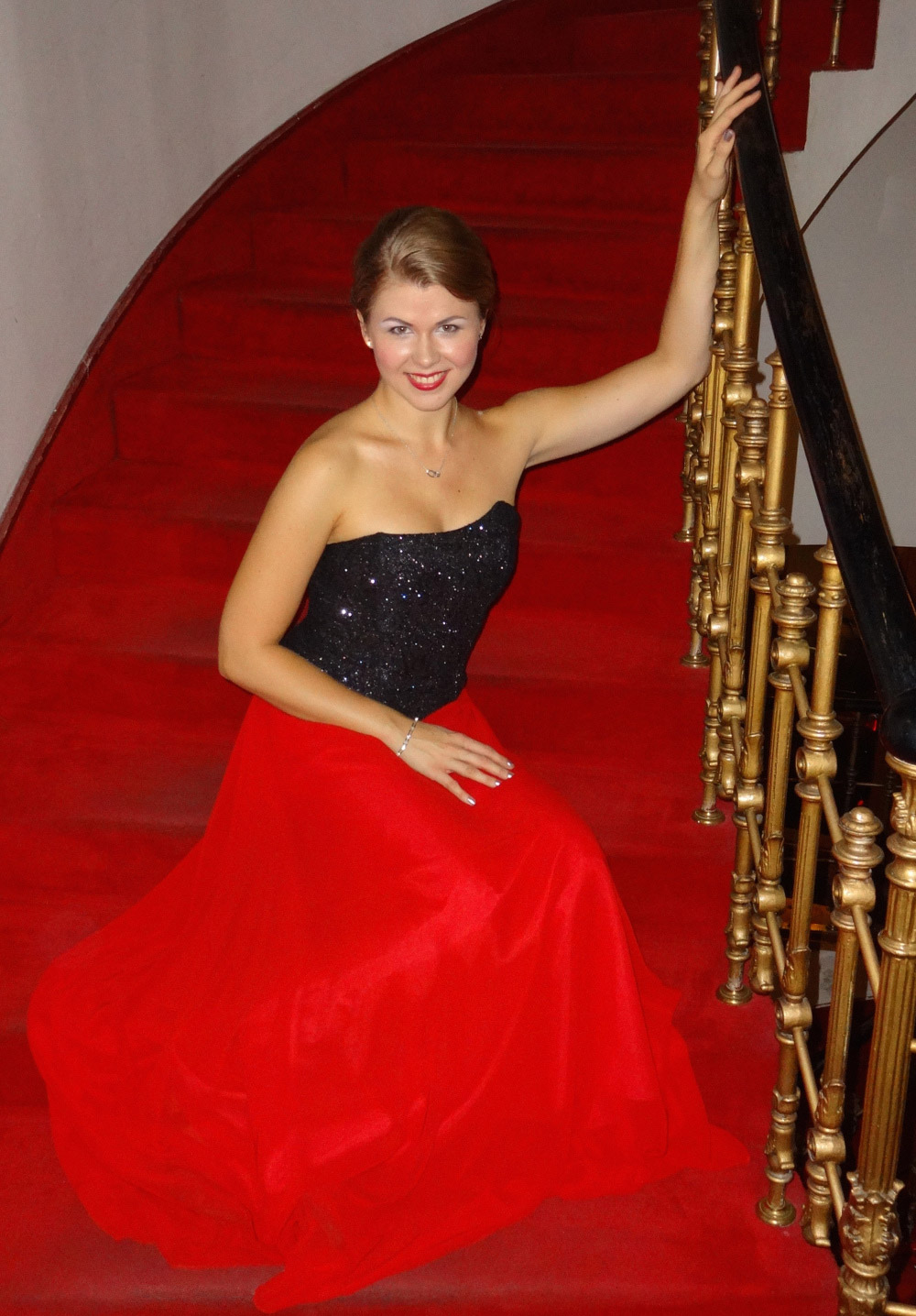
The Olomouc Baroque Festival has begun. In the local Jesuit Convent the seventh year of the festival opened with the modern premiere of the serenata Il tribunale di Giove by the Austrian composer Karl Ditters von Dittersdorf. The work was first performed at the birthday celebrations for the Prussian King Frederick the Great on 27 January 1775 and after a repeat in Wroclaw in 1777 it fell into oblivion. The Ensemble Damian decided to reverse this unfortunate fate, and led by the ensemble’s artistic director and director Tomáš Hanzlík they attempted to revive the work. Appearing in the solo roles were Leandro Lafont (Fate and Apollo), Kristýna Vylíčilová (the Genius of Europe and Minerva), Lucie Kaňková (Time and Fortune), Monika Jägerová (Jupiter) and Jakub Rousek (Mars). The costumes and backdrops were designed by the director Hanzlík.
Those who have previously seen the stage productions directed by Tomáš Hanzlík will be familiar with his signature and aesthetic. They involve richly decorated costumes, paper backdrops referring to the baroque theatre (this time however omitted), expressive gestures inspired by contemporary practices or a stubborn effort to bring the situation played out on stage to absurd scenes balancing on the edge of parody and kitsch. No-one can object too much to humour and some Hanzlík creations quite deservedly evoke laughter in the audience. Others, however, are on the boundaries of good taste such as when, for example, the god Mars in boxing gloves imitates punches in the ring toward the paper figure of the ruler. The bass player in folk costume is after that rather innocent fun.

However a problem arises when the staging framework slowly turns into a steadily more confining template, tighter with every opera or serenata. Almost every Hanzlík production – except for the excellent and stylistically completely different L’Arianna which was created together with Vít Zouhar – plays on the same string with the audience, and it is a pity that the artist does not attempt to explore other possibilities that have proven themselves in for example Arianna.
I am not saying that the director’s approach does not work, only that it is not evolving. And given the excellent work done by Tomas Hanzlik, this is a great pity. This time Hanzlík chose minimalist and paperless backdrops which is a nice change. The centre of the stage in the first act is the entrance to a cave. The second and third have a boxing ring, which is festooned with body parts. From there, the gods, arguing as to which of them is the more important and powerful figure, come up with the figure of an ideal ruler, subsequently identified as Frederick the Great. In essence, it is a functional and attractive premise that points to Hanzlík’s desire to play and not take things too seriously. However, if the frequent antics for the purpose of forced comedy were reduced it could be even better. In terms of choreography, however, there was very effective use of an ascending and descending ladder with the singers in Mars’ aria which turned so that Jakub Rousek was constantly rising and falling in an endless majestic movement.

The soloists were a source of joy, from among which it would be difficult to pick a clear favourite. The excellent Kristýna Vylíčilová sang the Genius of Europe and Minerva with certainty of intonation, intuitive work with dynamics, and always with a clear interpretive and expressive goal. According to the circumstances she changed the vocal colour from menacingly dark to bright and cheerful, remaining in the role in every sigh, sob and scream. Also Lucie Kaňková in the roles of Time and Fortune managed the demanding coloratura with honour and her aria complaining of the fate of fortune was among the most touching. The gentle countertenor Leandro Lafont was more suited to the figure of Apollo than Fate, which in places lacked determination and perhaps a certain authoritativeness. Conversely, as Apollo the singer made good use of all the delicate grace and elegance belonging to this character. Jakub Rousek’s somewhat unusual colour and more civil voice was a surprise as Mars, with the recitatives lacking a certain rougher and more martial energy, but in the arias themselves he was able to portray the god of war with militant and dramatic expression. The uncrowned queen of the evening was Monika Jägerová in the role of Jupiter – powerful, full of colour, understandable and a dramatically carrying alto truly inspiring awe and humility. She deserves to be highlighted not only for her work with dynamics, which created a great musical effect, but perhaps even more for the expressive breaks which she opted for in her interpretation.
The orchestra was with minor exceptions stable in intonation and rhythm and under the leadership of Hanzlík dynamically rich. There were occasional errors from the brass section, but this was not anything that in any significant way influenced the musical experience. We should feel sorry for the double bass. It is an irony of fate that when as the support of Fortune he appeared in the “duet” on the stage, the instrument itself did not have much luck. It was necessary to occasionally retune it. Despite these difficult circumstances, however, he gave a good performance.
The serenata Il Tribunale di Giove by the composer Karl Ditters successfully launched the 7th annual Olomouc Baroque Festival and despite some inherently subjective bits on which opinions can and will vary, it was a production that not only entertained its audience, but also introduced them to unjustly forgotten music that fully deserves a place in concert halls and opera houses.
Karl Ditters von Dittersdorf: Il tribunale di Giove
Time / Fortune: Lucie Kaňková
Genius of Europe / Minerva: Kristýna Vylíčilová
Jupiter: Monika Jägerová
Fate / Apollo: Leandro Lafont
Mars: Jakub Rousek
Director: Tomáš Hanzlík
9 July 2019, Jesuit Convent, Olomouc
Photo by Daniel Berka

